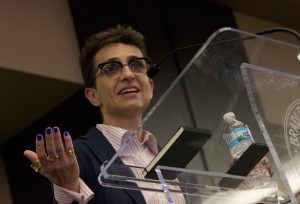
Photo by Andrea Morris
Bradley Universitys communications department continued its trend of bringing relevant speakers to campus for the Robison Lecture by hosting famed Russian journalist Masha Gessen this past Tuesday.
Gessen was born in Russia, but her family moved to America when she was a teenager. She later returned to Moscow to work as a journalist but was forced to leave again in 2013 when she became worried for the safety of her family. She has written critical articles and books about LGBT rights in Russia, Vladimir Putin and Donald Trump.
According to Gessen, one concept she thinks about most as a journalist is imagination. During the lecture, she made the case for why imagination matters in journalism, non-fiction and thinking in general.
Imagination may seem like an odd thing for a journalist to be obsessed with, because Im not a fiction writer, Gessen said. I dont think about fiction writing; I actually think about non-fiction writing all the time.
Gessen said this topic first came to her mind after the recent presidential election, when she was speaking with a friend about Trumps road to the presidency. According to Gessen, her friend felt Trump succeeding would not be feasible.
He said, I just cant imagine him getting the nomination. I thought this was a really concise way of summing up one of the most common thinking mistakes that we make, said Gessen. We give in to the limitations of our own imaginations. When we cant imagine something, we figure out a way to get around imagining it.
One example of this problematic phenomenon Gessen spoke about occurred the night of the election, when journalists around the world expected Hillary Clinton to win the race.
I was on standby for the New York Times Around 1:30 a.m. I thought, Theres no way Im going to be writing about the reaction to Hillary Clintons victory in Russia, Gessen said. The New York Times had put together a selection, a package about Hillary Clintons victory [in advance]. They couldnt imagine it would go any other way. That failure of the imagination was so huge.
Following the lecture, audience members asked Gessen multiple questions, and many in attendance said they were engaged by her Q&A session.
Imagination was an interesting explanation, David Tegg, a Peoria resident in attendance, said. [Gessen] had a valid point, too, when [Trump] said, Make America Great Again. He never really said what that was. I wasnt aware that we werent great anymore.
Sara Netzley, associate professor of journalism, was part of the committee that chose Gessen as the Robison lecturer. She said she was glad to bring such a topical speaker to campus.
I wondered in February whether Russia and Putin would still be relevant by September. But it is, Netzley said. I think the good turnout we [saw] from students and community is a testament to how interested people are in the topic of journalism, fake news, Russia [and] Trump.




